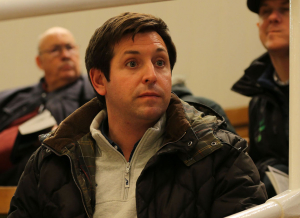OCALA, FL – The Ocala Breeders' Sales Company's June Sale of 2-Year-Olds in Training duly marched through its opening session with a $450,000 son of Hard Spun one of three horses to top the $200,000 mark Tuesday in Ocala.
At the close of business Tuesday, 192 juveniles had sold for a gross of $7,110,400. The average of $37,033 was up from the 2022 session's final average of $34,431–which included post-sale transactions–but was down from the end-of-session figure of $38,628. The median of $20,000 dipped from the final figure of $22,000, as well as from the end-of-session figure of $25,500. With 74 horses reported not sold, the session's buy-back rate was 27.8%.
Before the inclusion of post-sale transactions, last year's opening session of the June sale saw 184 head sell for a gross of $7,107,500. The average was $38,628 and the median was $25,500. With 90 horses reported not sold at the fall of the day's last hammer, the 2022 opening-session buy-back rate was 33.1%. That figure improved to 20.7% as a further 33 horses sold post-sale, bringing the final gross to $7,756,400.
Midway through Tuesday's session, Frank Fletcher, bidding alongside agent Donato Lanni, went to $450,000 to acquire a son of Hard Spun from the de Meric Sales consignment. Late in the day, Fletcher returned to acquire the day's second-highest priced offering, going to $230,000 to acquire a colt by Malibu Moon from Gene Recio's consignment.
The session-topper led a day of mixed-bag results for de Meric Sales, which sold all 10 of its horses through the ring for $988,700 and was the session's leading consignor. The consignment had results everywhere from the session-topping $450,000 price tag down to $3,700.
“We saw a little bit of everything today,” admitted Tristan de Meric. “It's definitely a little spotty at best, but there is still some demand for the more quality horses. There is a bit of action in the lower-middle, but not as much as we'd all like to see for the number of horses here. I think it's basically typical of the June sale, but maybe a little more magnified this year.”
The Hard Spun colt was making his first sales appearance of the year, an angle which has worked well for the consignment in the past, according to de Meric.
“He was sent down to Florida and started in January and we always thought of him as a horse for this sale,” de Meric said. “We've found that a fresh horse in this sale can stand out. People always like to see one for the first time. And that horse stepped up and did everything right. We have done well with horses like him at this sale and, even this year in a spottier market, we are happy with this result and best of luck to Frank Fletcher and Donato.”
The OBS June sale continues through Thursday with sessions beginning daily at 10 a.m.
Fletcher Gets His Hard Spun Colt
Frank Fletcher flew down to Ocala Tuesday morning with the specific intention of purchasing a colt by Hard Spun and the Arkansas native did not go home disappointed, securing hip 130 for $450,000 from the de Meric Sales consignment midway through the first session of the June sale.
“I just flew down this morning and Donato Lanni showed him to me,” Fletcher said. “He liked his work, he likes the way he's built and he likes his speed.”
Bred by Reiley McDonald's Athens Woods, the chestnut colt is out of stakes-placed Mine All Mine (Belong to Me) and is a half-brother to stakes-winner Athens Queen (Majestic Warrior). The juvenile worked a furlong last week in a co-bullet :9 4/5.
SESSION TOPPER @OBSSales!
Hip 130, a #HardSpun colt that worked in a blistering :9 4/5ths, sells to Frank Fletcher Racing Operations for $450,000!
Consigned by de Meric Sales, Agent, the juvenile is out of a Stakes-placed mare who is also the dam of Astoria Stakes winner… pic.twitter.com/L8ujAtTTQX
— Darley in America (@DarleyAmerica) June 13, 2023
“We are always looking for 2-year-old colts,” Fletcher said. “And it's exciting to get him. I always like coming down here. I love this city and I love this sale. I've been coming here for 25 years.”
Fletcher famously names all his horses with some form of Rocket or Rockette in their names. Does he have a name already picked out for this colt?
“He will be something rocket,” Fletcher said with a laugh. “I had a horse down here earlier this year in the sale and she worked so well, I withdrew her from the sale and I named her Almost Gone Rocket.”
Fletcher had to see off a determined internet bidder to secure the colt, but said he never had a doubt that he was going to come out on top.
“We were going to get him one way or another,” he said. “I flew down for him. So I'd be very sad if I was going home without him.”
Fletcher said no trainer had been picked out for the youngster.
Goodman Has High Hopes for First Pinhook
Billy Goodman, whose involvement in racing started almost by accident and evolved into a full-on passion, is hopeful his first foray into the juvenile pinhooking market proves just as successful when he and partner Caio Caramori send a colt by American Pharoah (hip 1030) through the OBS sales ring with the SBM Training and Sales consignment Thursday.
Goodman purchased the colt for $100,000 at last year's Keeneland September sale. He is out of Jeweliana (Smart Strike), a daughter of multiple graded winner Roshani (Fantastic Light) and the dam of $775,000 juvenile Nile River (American Pharoah).
“He just had all the right parts,” Goodman said of the colt's appeal last fall. “He was a May 5 foal and a little immature, but I kind of looked at him like, if he just expands exactly as he is right now, he's going to be an absolute beast of a horse. He had an incredible walk and an incredible mind on him. And all of those things came to fruition with him. He blossomed into this incredible specimen and he's got a mind on him like a 4-year-old stakes horse.”
Goodman had never even touched a horse when he decided to make a major pivot in his life some 12 years ago.
“Back in 2011, I was managing an Irish pub in Miami for a childhood friend,” he explained. “Things just weren't going well and I didn't enjoy it, so I decided to stop. I got a license at Gulfstream and went on the backside and asked for a job. I got a job walking hots.”
Goodman, who began working for trainer Peter Gulyas in Florida, eventually made his way to Kentucky and the barn of trainer Todd Pletcher.
“I worked for Todd for six years as a groom,” Goodman said. “I was a hotwalker and then a groom and within two months we had two horses in the Derby and My Miss Sophia was second in the Oaks.”
Of his experience with horses before that, Goodman admitted, “None. Zero. Never touched a horse. I always knew that I would at some point. Horses were in my system. I was 45 and I said, 'All right, it's time to do this.'”
Goodman purchased his first horse, Eternal Heart, for $50,000 at the 2018 Fasig-Tipton Midlantic October Sale. Now six, the West Virginia-bred mare is still in his care.
“I was just bathing her when you called,” Goodman said of Eternal Heart. “This is going to be her last year racing. I bought this filly and gave her to my friend Caio Caramori, who is a trainer. I went to the barn to help out and I wound up working for him. And I'm still working for him and still buying horses.”
Goodman purchased a few weanling-to-yearling pinhooks and enjoyed success on a small scale before deciding to put together a partnership to make his six-figure investment in an American Pharoah colt last year.
“This is the first decent horse that we put a little money together and bid $100,000 on him,” Goodman said.
The colt was originally targeted at the Fasig-Tipton Midlantic May sale, where he was to sell under the Goodman Caramori banner, but the partners decided to call an audible earlier this year.
“We broke him and trained him at the Classic Mile right there in Ocala,” Goodman said. “We spend the winters down there. We were going to consign himself ourselves at Timonium, but he just got shins. I was battling shins because we got a late start on him. I could have brought him there, but I didn't think it was right for the horse. So we backed off on him a little bit and sent him to Susan Montanye. She's got him now because I had to go back to Lexington. We have 45 horses here.”
The colt proved the extra time was worthwhile with a :10 flat work at last week's under-tack show.
“Susan took care of his shins and didn't do too much with him and he went over there and went :10 flat, :20 3/5 and :33 2/5,” Goodman said. “He's just a beast of a horse. He really didn't train all that much and did that. It was kind of freakish what he did.”
Goodman expects to be back in action at the upcoming yearling sales.
“I am going to be buying in July, hopefully, and go to New York and September,” he said. “We will probably have 40 horses down there in Ocala, total, but we will probably put together four or five [to pinhook] with this group, if this horse sells the way we think he will. And I'll try to build a little business from there, buy our own and do it like that.”
The post Hard Spun Colt ‘Rockets’ To Top At Workmanlike OBS June Opener appeared first on TDN | Thoroughbred Daily News | Horse Racing News, Results and Video | Thoroughbred Breeding and Auctions.


